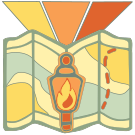Resources
Resources - Attention
- How to Practice Acceptance Without Being Complacent - "Mindful "acceptance" means that we fully acknowledge the current moment (external situation as well as feelings, thoughts, and perceptions) so that we can respond appropriately in the next moment."
- Practicing Non-Judgment - "What would it be like to simply experience something, without judgment?"
- How Present-Moment Awareness Can Make Life More Meaningful - "Presence involves a simple yet incredible shift—from the ordinary state of mind wandering to bringing our attention to the experience of what is happening right now. You can make this shift anytime, anywhere."
- Non-Judgment for Beginners! - "Non-judgment is a HOW skill where we practice being present in the current moment and stating a fact without adding our personal opinion to it."
- Acceptance is not Giving Up, it is Waking Up - "Acceptance allows us to see things as they really are, rather than spending so much time being pulled off-course by our attachment to our desire that things were different."
- Getting Started with Mindfulness - "Mindfulness is the basic human ability to be fully present, aware of where we are and what we’re doing, and not overly reactive or overwhelmed by what’s going on around us."
- Prajñā (Buddhism) - "..."wisdom", "intelligence", or "understanding" ... of the true nature of phenomena"
- Conscious breathing - "Conscious breathing is an umbrella term for methods that direct awareness to the breath. These methods may have the goal of improving breathing, or the primary goal can be to build mindfulness. Human respiration is controlled consciously or unconsciously."
- Anapanasati - "... meaning "mindfulness of breathing" ... refers to inhalation and exhalation, paying attention to the breath. It is the quintessential form of Buddhist meditation."
- Vipassanā - "insight meditation is directed towards developing "insight into the true nature of reality.""
Resources - Adaptation
- Experience the Truth of No Self - "The teaching of anatta, or nonself, is considered the most liberating tenet of the Buddhist teachings. Describing how we’re bound, fettered, and limited by the sense of ourselves as separate and self-existing, this teaching offers the possibility of unbinding and freeing the heart and mind."
- Mereology - "In logic, philosophy and related fields, mereology ... is the study of parts and the wholes they form."
- Impermanence is Buddha Nature - "Change isn't just a fact of life we have to accept and work with... To feel the pain of impermanence and loss can be a profoundly beautiful reminder of what it means to exist."
- Material Composition - "A material composite object is an object composed of two or more material parts. The world, it seems, is simply awash with such things."
- Different Answers to the Special Composition Question - "Our intuition tells us that four legs and a tabletop make a table and that four walls and a roof make a house. However, I think we can all agree that a birdhouse and a pair of shoes do not compose a further object. The Question of Material Composition seeks to find the reason for this."
- Middle Way - "... a middle way that avoided the two extremes of self-indulgence or self-denial ... a view that is free from the extremes of eternalism and nihilism."
- Pratītyasamutpāda - "... "if this exists, that exists; if this ceases to exist, that also ceases to exist" ... [all things] arise in dependence upon other things."
- Sunyata in Buddhism: Understanding the Concept of Emptiness - "Sunyata, also known as emptiness and a central concept in Buddhism, explores the interdependence and interconnection of everything."
- How Mindfulness and Gratitude Go Hand in Hand - "Gratitude allows you to notice your blessings and create balance from life’s difficulties. Mindfulness helps you handle tough times with grace, acceptance, and surrender. Together, these practices nurture what Buddhists call the “Higher Self” within you."
- Dvesha (Aversion) - "... (hate, aversion) is the opposite of raga (lust, desire) ..."
- A Meditation for Decentering Your "Self" (And Why You Should Do It) - "When we realize that our “self” is really a process and not a fixed thing we can make space for less self-absorption and more compassion for others."
- Raga (Attachment) - "... any form of "greed, sensuality, lust, desire" or "attachment to a sensory object""
Resources - Association
- Sakshi (witness), Vedanta (mind) - "... this table is an object of experience to my eyes. My eyes and the body are objects of experience to my mind. And my mind is an object of experience..."
- Prakāśa, the self-reflexive nature of awareness - "... in the process of being aware of any object, consciousness also illuminates itself at the same time..."
- Nondualism - ""not-two" or "one without a second""
Body Scanning Resources
Note that these resources are more focused on a Meditation approach to Body Scanning, which is not necessarily emphasized in Everyday Enlightenment. However, studying how to do body scan meditation can only improve your ability to perform body scans as part of your everyday living.
- Body Scan Meditation - Note that here Body Scanning and Muscle Relaxation are mixed together.
- The Mindfulness Body Scan - This page focuses on curiosity.
- Body Scan Meditation - More of an article, but includes some "scripts" on guided body scans
Entanglement
Great Doubt
- Daily Zen: Great Doubt - Great doubt, great awakening; no doubt, no awakening.
General Meditation Resources
- Deconstructing Yourself - a huge amount of information and articles, some exercises are woven throughout
